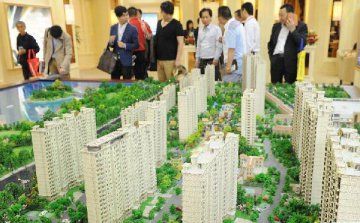
China's policymakers will likely tighten controls on the property market as home prices have risen sharply in some medium-sized cities, industry insiders predicted.
Official data showed Wednesday that 65 of 70 major Chinese cities posted month-on-month increases in new home prices in April, the largest number in 28 months.
Expansion in China's four first-tier cities -- Beijing, Shanghai, Guangzhou and Shenzhen -- was moderated by increased thresholds for home purchases in Shenzhen and Shanghai following rocketing prices.
However, some provincial capitals and other second-tier cities, particularly Hefei, Xiamen, Nanjing and Suzhou, saw month-on-month rises of around five percent, outpacing the four metropolises.
Many of these medium-sized cities are situated around regional or national economic hubs, where markets are deeply influenced by performances in neighboring big cities.
"Overheated markets in first-tier cities have shown signs of cooling down. But unreasonably rapid growth in some second-tier cities needs to be curbed," said Hu Jinghui, vice president of property brokerage firm 5i5j.
"It is unsettling to see accelerating price growth in medium-sized cities, which may lead to restrictions," said Ren Qixin, deputy general manager of Yahao Real Estate Selling and Consulting Solution Agency.
Some speculative funds moved from first-tier cities to second-tier ones for higher returns, propping up both land and home prices, according to Yan Yuejin, a senior researcher with E-house China R&D Institute.
In Suzhou City, 13 land plots auctioned recently were sold at an average of 200 percent of starting prices. In Nanjing City, land for housing development was also auctioned at startlingly high prices.
"Land prices in Suzhou and Nanjing had bubbles. Extremely high prices were abnormal," said Sun Hongbin, chairman of Sunac China Holdings Limited, a Hong Kong-listed property developer, adding that the government should take precautions against "land sale fever."
Government action is under way or in the pipeline. Suzhou Municipal Bureau of National Land and Resources has set price caps on 10 land plots that will be auctioned off. "Bids higher than the caps will be invalid," said the bureau.
The Chinese Ministry of Housing and Urban-Rural Development is mulling stricter supervision of property brokerage firms to reduce misinformation and market hype, said Chen Sheng, head of the China Real Estate Data Academy.
Property is one of the pillar industries driving China's economy. The government is trying to reduce huge housing inventory caused by investment mania following the 2008 global financial crisis.
Although rapidly rising home prices in medium-sized cities have raised concerns, rebounding prices in small cities and towns, from drops to mild advances in April, signaled a thaw in these inventory-haunted regions.
Official data showed the floor area of finished yet unsold property nationwide totaled 727 million square meters at the end of April, down 8.26 million in April and down 12.41 million in April and March together.
There is room for more stimulus measures targeting small cities and towns, according to Chen. Moderated price growth in first-tier cities, rapid expansions in second-tier ones and a recovery in third-tier cities require Chinese policymakers to walk a fine line to set differentiated property market rules.
An "authoritative figure" noted that the property market bubble is one of the risks China is facing, according to an interview with The People's Daily. "Homes are built for people to live in," said the figure.




















Latest comments